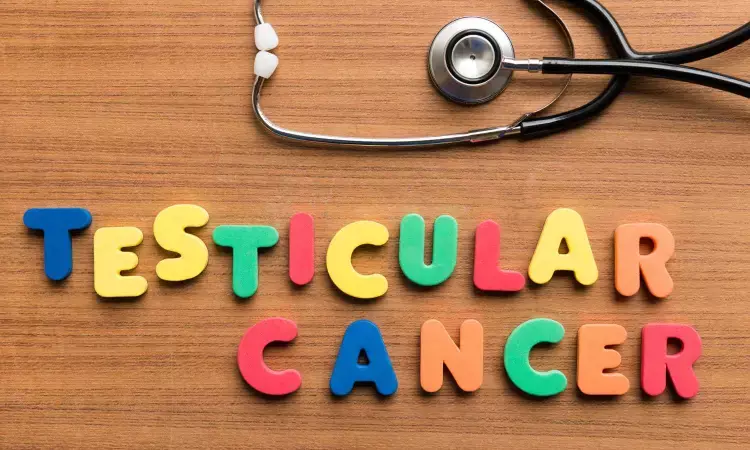- Home
- Medical news & Guidelines
- Anesthesiology
- Cardiology and CTVS
- Critical Care
- Dentistry
- Dermatology
- Diabetes and Endocrinology
- ENT
- Gastroenterology
- Medicine
- Nephrology
- Neurology
- Obstretics-Gynaecology
- Oncology
- Ophthalmology
- Orthopaedics
- Pediatrics-Neonatology
- Psychiatry
- Pulmonology
- Radiology
- Surgery
- Urology
- Laboratory Medicine
- Diet
- Nursing
- Paramedical
- Physiotherapy
- Health news
- Fact Check
- Bone Health Fact Check
- Brain Health Fact Check
- Cancer Related Fact Check
- Child Care Fact Check
- Dental and oral health fact check
- Diabetes and metabolic health fact check
- Diet and Nutrition Fact Check
- Eye and ENT Care Fact Check
- Fitness fact check
- Gut health fact check
- Heart health fact check
- Kidney health fact check
- Medical education fact check
- Men's health fact check
- Respiratory fact check
- Skin and hair care fact check
- Vaccine and Immunization fact check
- Women's health fact check
- AYUSH
- State News
- Andaman and Nicobar Islands
- Andhra Pradesh
- Arunachal Pradesh
- Assam
- Bihar
- Chandigarh
- Chattisgarh
- Dadra and Nagar Haveli
- Daman and Diu
- Delhi
- Goa
- Gujarat
- Haryana
- Himachal Pradesh
- Jammu & Kashmir
- Jharkhand
- Karnataka
- Kerala
- Ladakh
- Lakshadweep
- Madhya Pradesh
- Maharashtra
- Manipur
- Meghalaya
- Mizoram
- Nagaland
- Odisha
- Puducherry
- Punjab
- Rajasthan
- Sikkim
- Tamil Nadu
- Telangana
- Tripura
- Uttar Pradesh
- Uttrakhand
- West Bengal
- Medical Education
- Industry
Surgery effective alternative to chemotherapy and radiation for early metastatic testicular cancer

A newly published study paves the way for some patients with testicular cancer to avoid chemotherapy and radiation.
Seminoma is a slow-growing form of testicular cancer that if untreated, typically metastasizes (spreads) to lymph nodes in an area behind the abdomen lining called the retroperitoneum. The standard treatment for patients at this stage is chemotherapy and radiation to shrink and kill the cancerous lymph nodes.
While effective, chemotherapy and radiation are associated with long-term side effects, such as cardiovascular disease and secondary cancers, that adversely affect a patient’s quality of life.
Now, however, the results of a multi-institutional clinical trial recently published in the Journal of Clinical Oncology show that surgically removing the affected lymph nodes in the retroperitoneum is an effective alternative to chemotherapy and radiation with fewer long-term side effects.
“We found that the majority of participants in the study were cured with surgery alone, avoiding the toxicities associated with traditional therapies. We are confident that surgery for this disease state will be included into treatment guidelines in the near future,” said Sia Daneshmand, MD, a urologic oncologist with Keck Medicine of USC and lead investigator of the clinical trial.
Daneshmand is also a member of USC Norris Comprehensive Cancer Center, part of Keck Medicine.
Testicular cancer is generally a treatable cancer that most commonly affects men ages 15-35. When testicular cancer only spreads to the retroperitoneum, it is classified as early metastatic or stage 2 seminoma.
The procedure to remove lymph nodes from the retroperitoneum-known as a retroperitoneal lymphadenopathy-is an established treatment for metastatic testicular cancer when chemotherapy fails to eradicate all affected lymph nodes. However, surgery has not traditionally been considered a viable stand-alone treatment for early metastatic seminoma.
The national study enrolled 55 patients across 12 institutions to investigate if surgery could replace chemotherapy and radiation as an effective treatment, thereby sparing patients the long-term risks associated with the two traditional therapies.
Study participants had previously undergone surgery to remove the testicle(s) where the original cancer occurred, and their cancer had progressed no further than to the retroperitoneum. Once enrolled, the patients underwent a retroperitoneal lymphadenopathy by certified surgeons at participating institutions around the country and one site in Canada.
Keck Hospital of USC performed 15 of the surgeries. Most of the Keck Medicine patients were able to go home 24 hours after surgery with minimal or no complications, according to Daneshmand.
Daneshmand and his colleagues found that 81% of the patients demonstrated a two-year recurrence-free survival rate. The 20% who did experience recurrence of the cancer were successfully treated with either chemotherapy or additional surgery for an overall survival rate of 100%.
“A 100% survival suggests that a cure can still be achieved even in patients who experience recurrence after the surgery,” said Daneshmand.
Daneshmand acknowledges that not all hospitals or medical centers have the expertise or resources to successfully complete retroperitoneal lymphadenopathy. He advises patients to look for an academic medical center to discuss the possibility of surgery over traditional therapies.
“Early metastatic seminoma has a very high survival rate; however if treated with chemotherapy and radiation, the cure can come at a high cost,” he said. “Surgery gives patients both the opportunity to be cured and experience a high quality of life post-cancer.”
Reference:
Siamak Daneshmand , Clint Cary, Timothy Masterson,Lawrence Einhorn, Nabil Adra , Stephen A. Boorjian, Christian Kollmannsberger ,Anne Schuckman, Alan So, Peter Black, Aditya Bagrodia , Eila Skinner, Mehrdad Alemozaffar, Timothy Brand, Scott Eggener , Phillip Pierorazio , Kelly Stratton, Lucia Nappi, Craig Nichols, DOI: 10.1200/JCO.22.00624.
Dr Kamal Kant Kohli-MBBS, DTCD- a chest specialist with more than 30 years of practice and a flair for writing clinical articles, Dr Kamal Kant Kohli joined Medical Dialogues as a Chief Editor of Medical News. Besides writing articles, as an editor, he proofreads and verifies all the medical content published on Medical Dialogues including those coming from journals, studies,medical conferences,guidelines etc. Email: drkohli@medicaldialogues.in. Contact no. 011-43720751


